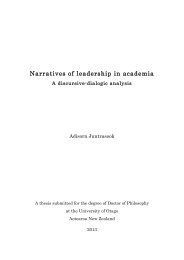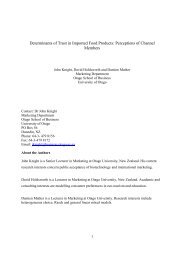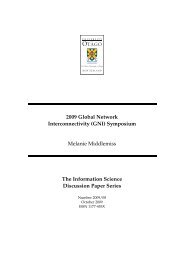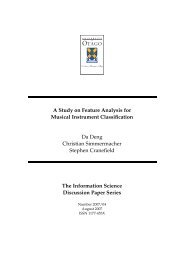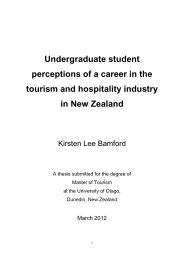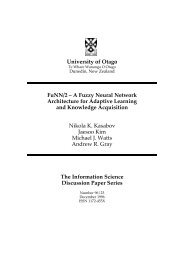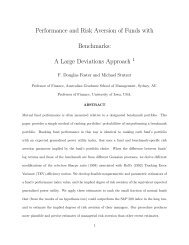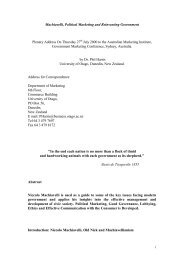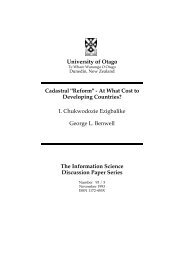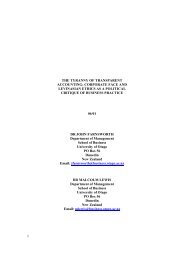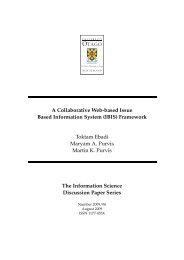Where is R2P grounded in international law? Anne-Marie Judson A ...
Where is R2P grounded in international law? Anne-Marie Judson A ...
Where is R2P grounded in international law? Anne-Marie Judson A ...
Create successful ePaper yourself
Turn your PDF publications into a flip-book with our unique Google optimized e-Paper software.
freedom to have or adopt a religion or belief. These rights may only be subject to<br />
limitations prescribed by <strong>law</strong> to protect public safety, order, health, morals or the<br />
fundamental rights and freedoms of others. Each state must not violate the rights of<br />
the liberty of parents or legal guardians to ensure the religious and moral education of<br />
their children <strong>in</strong> conformity with their own convictions.<br />
These rights that have been identified are non-derogable rights; they cannot be<br />
derogated from even <strong>in</strong> a state of emergency however the follow<strong>in</strong>g l<strong>is</strong>t of rights may<br />
be derogated under the head<strong>in</strong>g of state of emergency and under the prov<strong>is</strong>ions<br />
expla<strong>in</strong>ed under Article 4. They conta<strong>in</strong> the majority of the rights that are usually<br />
non-derogable dur<strong>in</strong>g times of peace or under other similar conditions that do not<br />
normally constitute an ‘exceptional case’ or the temporary nature of a state<br />
emergency. However some of these derogations also conflict with some of the nonderogable<br />
rights already expla<strong>in</strong>ed.<br />
NON-PROHIBITED VIOLATIONS DURING STATE OF EMERGENCY<br />
The rights that are unprotected dur<strong>in</strong>g a state of emergency are Articles 1, 2, 3, 4, 5,<br />
9, 10, 12, 13, 14, 19, 20, 21, 22, 23, 24, 25, 26 and 27. The other Articles relate only<br />
to the prov<strong>is</strong>ions and the responsibilities of the state to th<strong>is</strong> Convention. It could also<br />
be argued that these too could be derogated from dur<strong>in</strong>g a state of emergency as the<br />
only conditions that were l<strong>is</strong>ted as non-derogable were 6, 7, 8 paras 1 and 2, 11, 15,<br />
16 and 18. The follow<strong>in</strong>g <strong>is</strong> a l<strong>is</strong>t of the derogations that may take place. They will be<br />
described <strong>in</strong> toto rather than separated by <strong>in</strong>dividual div<strong>is</strong>ions due to the extensive<br />
nature of their descriptions. These articles are not <strong>in</strong>cluded <strong>in</strong> the prohibited articles<br />
under Article 4.<br />
Dur<strong>in</strong>g a state of emergency states may derogate from the right to selfdeterm<strong>in</strong>ation,<br />
318 the right to political status, the right to freely pursue economic, and<br />
social and cultural development; the right to freely d<strong>is</strong>pose of one’s natural wealth and<br />
resources without prejudice to any obligations ar<strong>is</strong><strong>in</strong>g out of <strong>in</strong>ternational economic<br />
co-operation, mutual benefit and <strong>in</strong>ternational <strong>law</strong>; the right to subs<strong>is</strong>tence; the right<br />
to the present Covenant without d<strong>is</strong>t<strong>in</strong>ction; The right to effective remedy, the right to<br />
a competent authority, to judicial remedy, and the right to enforcement of the current<br />
318 Article 1 <br />
<br />
100



